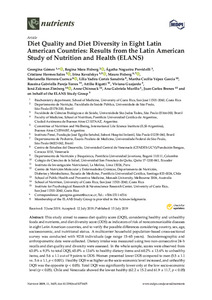Por favor, use este identificador para citar o enlazar este ítem:
https://repositorio.uca.edu.ar/handle/123456789/9710| Título: | Diet quality and diet diversity in eight Latin American countries : results from the Latin American Study of Nutrition and Health (ELANS) | Autor: | Gómez, Georgina Fisberg, Regina Mara Nogueira Previdelli, Ágatha Hermes Sales, Cristiane Kovalskys, Irina Fisberg, Mauro Herrera Cuenca, Marianella Cortés Sanabria, Lilia Yadira Yépez García, Martha Cecilia Pareja Torres, Rossina Gabriella Rigotti, Attilio Guajardo, Viviana Zalcman Zimberg, Ioná Chinnock, Anne Murillo, Ana Gabriela Brenes, Juan Carlos |
Palabras clave: | AMERICA LATINA; NUTRICION; DIETA; ALIMENTACION; ALIMENTOS; ENCUESTAS | Fecha de publicación: | 2019 | Editorial: | MDPI | Cita: | Gómez, G. et al. Diet quality and diet diversity in eight Latin American countries : results from the Latin American Study of Nutrition and Health (ELANS) [en línea]. Nutrients. 2019, 11(7). doi:10.3390/nu11071605 Disponible en: https://repositorio.uca.edu.ar/handle/123456789/9710 | Resumen: | Abstract: This study aimed to assess diet quality score (DQS), considering healthy and unhealthy foods and nutrients, and diet diversity score (DDS) as indicators of risk of noncommunicable diseases in eight Latin American countries, and to verify the possible differences considering country, sex, age, socioeconomic, and nutritional status. A multicenter household population-based cross-sectional survey was conducted with 9218 individuals (age range 15-65 years). Sociodemographic and anthropometric data were collected. Dietary intake was measured using two non-consecutive 24-h recalls and diet quality and diversity were assessed. In the whole sample, scores were observed from 63.0% ± 9.3% to total DQS, 65.0% ± 13.6% to healthy dietary items and 60.2% ± 13.6% to unhealthy items, and 5.6 ± 1.1 out of 9 points to DDS. Women presented lower DDS compared to men (5.5 ± 1.1 vs. 5.6 ± 1.1, p < 0.001). Healthy DQS was higher as the socio-economic level increased, and unhealthy DQS was the opposite (p < 0.05). Total DQS was significantly lower only at the low socio-economic level (p < 0.05). Chile and Venezuela showed the lowest healthy (62.2 ± 15.2 and 61.9 ± 11.7, p < 0.05) and total DQS (61.4 ± 10.3, 61.2 ± 8.7, p < 0.05). No effects were observed when considering the age and anthropometric measurements. Promoting consumption of a diverse and high-quality diet is an essential challenge to accomplish. | URI: | https://repositorio.uca.edu.ar/handle/123456789/9710 | ISSN: | 2072-6643 (impreso) 2072-6643 (online) |
Disciplina: | MEDICINA | DOI: | 10.3390/nu11071605 | Derechos: | Acceso abierto | Fuente: | Nutrients. 2019, 11(7) |
| Aparece en las colecciones: | Artículos |
Ficheros en este ítem:
| Fichero | Descripción | Tamaño | Formato | |
|---|---|---|---|---|
| diet-quality-diet-diversity.pdf | 477,97 kB | Adobe PDF |  Visualizar/Abrir |
Visualizaciones de página(s)
358
comprobado en 03-dic-2025
Descarga(s)
225
comprobado en 03-dic-2025
Google ScholarTM
Ver en Google Scholar
Altmetric
Altmetric
Este ítem está sujeto a una Licencia Creative Commons

